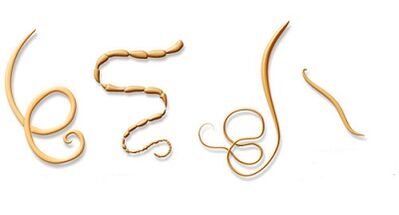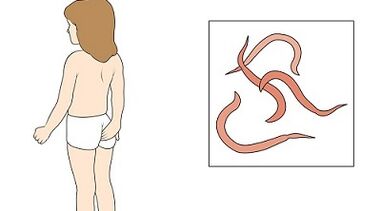In order to recognize the symptoms in time and successfully treat the parasites in the human body, patients should consult a doctor at the first signs of the disease.
There are currently about 300 species of microorganisms that can successfully exist in human internal organs.
The main way parasites are transmitted is through dirty hands, objects and food.
Invasive diseases are treated with drugs and traditional medicine; In severe cases, surgery may be required.
The main groups of parasites in the human body
Parasites in the human body that penetrate the internal environment feed on nutrients or body tissues.
In the future, the lack of micro and macronutrients, minerals and vitamins in patients leads to various disorders of all systems and organs.
Main routes of infection:
- oral-feces- parasites enter the human body after eating contaminated food and water;
- contact-house- larvae and worm eggs penetrate humans because they do not wash their hands after contact with infected objects or animals;
- through the skin- parasitic larvae penetrate the skin or by the bite of insect vectors.

There are several types of worms:
- round;
- lent;
- subcutaneous;
- waves;
- piece.
The roundworm group is the most widespread and widespread. Includes roundworms, pinworms, whipworms, toxocaras and worms.
Parasites enter the human body after eating contaminated food with dirty hands or mouth: fruits, vegetables, uncooked meat. Roundworms are located in the gastrointestinal tract of patients.
Among the tapeworms, cattle and pork tapeworm, tapeworm and echinococcus. The worms in this group are large. For example, a tapeworm can reach a length of 25 m.
Tapeworms in the human body can feed on any tissue and fluid. Sources of these parasites are improperly cooked meat and fish.
The next type is subcutaneous worms. They are widespread in the most exotic countries: Africa, India, Iraq, etc.
Signs of parasites in the human body - formations that move under the skin and cause severe pain.
Infection occurs when infected people are bitten by flies, mosquitoes or bedbugs.
Flukes (trematodes) - liver fluke (fluke or fasciola), schistosome, fascilopsis.
Parasites live in the human liver, pancreas, bile ducts and intestines.
Patients become infected with unboiled water, milk, unpasteurized cheeses, inadequately processed meat and fish.
Tissue parasites in humans include trypanosomes, fins, sarcosporidia, and microsporidia. Helminths of this group are located in the human liver, spinal cord and brain and muscle tissue.
Carriers of parasites are wild and domestic animals: horses, pigs, chickens and others. Tissue worms pass from people to poorly cooked meat.
Symptoms of parasitic pathologies
Symptoms and treatment of parasites in the human body vary depending on the type of worm.
Parasites have adapted perfectly to being inside human organs, making them their home.
Humans cannot detect the presence of worms at all, but parasitic invasions exacerbate the manifestations of chronic pathologies in adults and children. Often these symptoms indicate that parasites have entered the human body.
Worms and other parasitic organisms (protozoa or insects) feed and multiply in the human body.
They infect patients' eyes, skin, hair and internal organs. And only persistent fatigue, drowsiness or obesity indicates that the patient is a parasite carrier.

A sick person has the following symptoms of a parasitic infection:
- anemia that does not respond to treatment;
- weakness;
- unreasonable hunger;
- a sharp change in body weight in one direction or another;
- headache of unknown etiology;
- constipation, then diarrhea;
- nervous intestinal symptoms;
- feeling of heaviness in the liver;
- joint and muscle pain;
- skin manifestations (rash, neurodermatitis, etc. );
- decreased immunity;
- depression and neurosis;
- insomnia.
During the patient's examination, the doctor visually examines the skin.
Signs of parasites in the human body include rashes, acne, paleness, sweating, premature wrinkles, cracks, peeling and excessively brittle nails. Often these symptoms indicate the presence of parasites in the patient's GI tract.If a child is infected with pinworms, the symptoms of the parasite in the body are as follows - unbearable itching in the anal area.
The patient has growth retardation, underdeveloped ears, shortening of the fingers and hair loss, because in children parasites contain all the substances necessary for development.
Due to the presence of worms in the human stomach and other digestive organs, the mucous membrane becomes inflamed and a rich white coating forms on the tongue. Such patients should follow a diet table.
At the end of the examination, the doctor analyzes the general condition of the patient's whole body to determine the manifestation of pathogenic factors.
For example, the presence of parasites in the body of women is shown in the following way: patients have general weakness, back pain, menstrual irregularities, and inflammation of the bladder and kidneys. Men may develop prostatitis and impotence.
Drug treatment
Parasites are found in the lungs, intestines, muscles and other internal organs of humans. In children, the symptoms of the disease appear as in adult patients.
In order to treat parasites in a person as effectively as possible, the doctor must collect a complete medical history, including a description of the symptoms and a collection of tests. During treatment, the patient is prescribed a special diet.
Patients are referred to several tests before being prescribed anthelmintic tablets:
- fecal analysis for worm eggs;
- histology coprogram;
- serological blood test;
- hemoscanning.
Several drugs are used to kill worms in the treatment of parasites in children and adults.
Each anthelmintic drug aims to destroy a specific type of worm in the human body.
Specific antiparasitic agents are prescribed to patients only when the intended benefit outweighs the potential harm of treatment.
Patients should not choose antihelminthic drugs and do not treat themselves without consulting a doctor, because drugs in this group are very toxic to humans. In addition, patients are prescribed a diet when treating parasites.
Traditional methods of parasite control
Some folk remedies have anthelmintic effects, so the destruction of parasites at home is carried out with their help.
However, before starting treatment, patients should consult a doctor, because a diet with infusions of certain plants can be dangerous in some chronic pathologies of the human body.
The most effective means of getting rid of parasites in the body of patients are:
- garlic tincturepinworms in the human body to prepare an enema - to prepare it you need to knead 10 cloves of garlic, pour a glass of boiled water and leave for several hours;
- pumpkin seedsis a simple way to kill tapeworms in the intestines of patients. Eat 2 tablespoons peeled seeds for treatment on an empty stomach;
- onion infusion- used against ascariasis and pinworms in the human body. Finely chopped onion in half a jar, pour a solution of forty percent aqueous ethyl alcohol and insist for a week in a dark place. Then strain and take 1 tbsp. spoon half an hour before a meal. Only adult patients and non-alcoholic patients can be treated with infusion;
- walnut decoction- this remedy is used for roundworms in the human body. Immature fruits are crushed, poured boiling water and infused overnight. Then they drink in portions a day.
Following the recommendations of traditional medicine, you can get rid of worms from the human body with the help of spicy foods.
However, it should be used mildly in patients against parasites, as they have an irritating effect on the mucous membranes.
Pepper, ginger, mustard, garlic, onion, horseradish and cloves have a burning taste that is unacceptable for helminths in the human gut. Wormwood is often used as an anti-worm herb.
Pharmacies offer many drugs to kill parasites in the human body, but many have side effects and affect health.
Not all drugs to eliminate helminths in the human body are allowed for pregnant women and children.
Preventive measures to prevent the spread of parasites
Measures are the most effective way to protect against parasites in the human body. From childhood, all people are taught to wash their hands after walking in a flower bed, toilet or on the street, because the soil and dust contain the eggs of worms.
Before embarking on an exotic journey in the equatorial latitudes, people should get all the necessary vaccinations to avoid getting helminths.
By following simple precautions, anyone can successfully protect themselves from parasitic infections.
Rules of personal hygiene:
- Regular washing of the space under the hands and nails - this should be done after working in the sand, on the ground, after using the toilet, communicating with animals and before eating;
- Nails should preferably be cut short, as parasitic eggs can accumulate under the nails;
- Vegetables, fruits, berries and other fruits and herbs should be washed under running water for a long time. This ensures that all the eggs of the worms are washed from the surfaces;
- Meat and fish should be completely cooked. Bloody meat can be dangerous to human health because it contains eggs and parasitic larvae;
- You should not drink boiled water from wells and springs, as it may contain parasites;
- water and milk should only be boiled to kill worms;
- pasteurized lactic acid products should be consumed. Raw cheeses may contain eggs and parasitic larvae.
Experts recommend that you be regularly examined for the presence of parasites in the human body.
Do not take any antihelminthic agent as a prophylactic parasite in the internal organs due to its toxic effect.
Any form of self-medication of parasites in the human body can pose a health risk. If you have pets in your family, they should be dewormed regularly.
Preventing parasites in the human body can help prevent many dangerous worms.
Following the basic rules of personal hygiene can protect all family members, because helminthiasis in the human body is one of the most unpleasant parasitic diseases that disrupt the functioning of all systems and internal organs.
























